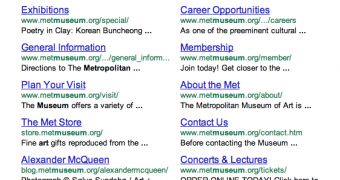Google has made several changes to the way sitelinks, links to content inside the same site in a Google search result, look and work. Google now displays more of them and with more details, but only if it's pretty sure you're looking for something from that particular site and not doing a more generic search.
"When you’re searching, you often have a specific task in mind, like figuring out which exhibits are showing at a nearby museum. Despite this narrow goal, people often start with a broad query," Daniel Rocha, Software Engineer at Google working with the Sitelinks Team, explained.
"For these searches, the first result may include a list of links to specific sections of the site, which are called 'sitelinks'," he said.
Google has been adding sitelinks to search results for a while now. So far, they've been simple short links to sections or content on the site. Webmasters can specify the sections they want showing in the results.
Google is now emphasizing sitelinks for searches since it believes it will provide a better experience for users.
"Sitelinks will now be full-size links with a URL and one line of snippet text—similar to regular results—making it even easier to find the section of the site you want. We’re also increasing the maximum number of sitelinks per query from eight to 12," Google announced.
Sitelinks will now look like regular results. They can also occupy more space, with 12 of them full with links, titles and description, they can take up most of the first page and only a few other results will make it above the fold.
Recently, Google has started including more results from the same websites for a query. This was because Google believed that for certain queries, and especially for large sites, different results from the same source were relevant.
Now, it's grouping all search results from the same website into sitelinks which Google says should help make the search results page more organized.
Google says the changes should be rolling out across all of its search sites in the next few days, but they've already been live for the English language version for the past few days. The feature also requires a modern browser, meaning no IE6, for some reason.

 14 DAY TRIAL //
14 DAY TRIAL //